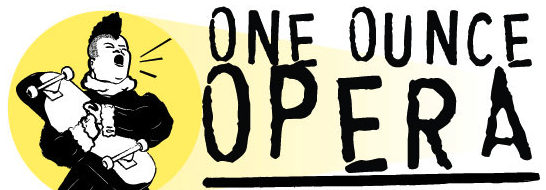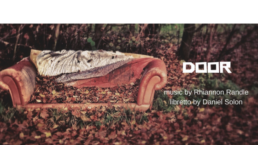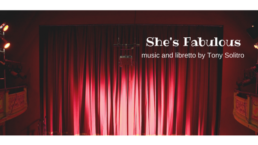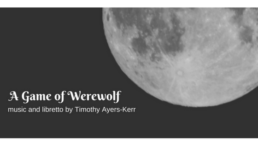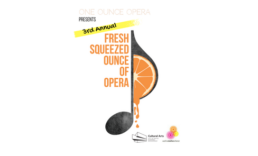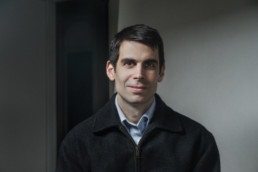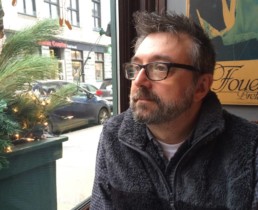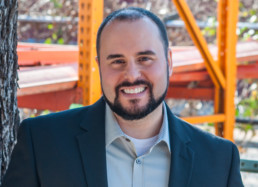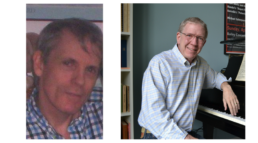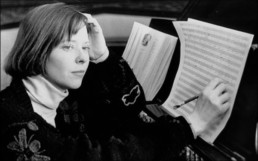FSOO Composer Spotlight: Rhiannon Randle and "DOOR"
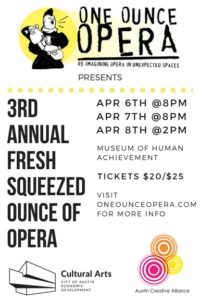 One Ounce Opera is thrilled to announce the American premiere of Door, and the unique opportunity to be directed by its librettist, dramaturg Daniel Solon. Door was first produced by Guildhall School of Music and Drama in association with the Royal Opera House in London. This powerful short opera takes us on a gripping journey through claustrophobia, relationship breakdown, depression and escapism. The cast - Robert LeBas, Julie Silva, Julie Fiore, and Dalton Flake - had these questions for Rhiannon Randle, composer:
One Ounce Opera is thrilled to announce the American premiere of Door, and the unique opportunity to be directed by its librettist, dramaturg Daniel Solon. Door was first produced by Guildhall School of Music and Drama in association with the Royal Opera House in London. This powerful short opera takes us on a gripping journey through claustrophobia, relationship breakdown, depression and escapism. The cast - Robert LeBas, Julie Silva, Julie Fiore, and Dalton Flake - had these questions for Rhiannon Randle, composer:
1. What inspired the rhythmic and the percussive focus of the piece?
The rhythm that drives the opera right from its opening bars is the incessant ‘knocking on the door’ that Andy hears inside his head. The rhythm is a visceral, musical expression of Andy’s paranoia about his front door: the door through which Laura came into his life, the one through which she left him, and pivotally, Andy's only remaining portal to the outside world; the source of his greatest fear, but also, ultimately, his greatest motivation. The rhythm came about as a wonderful accident, where Daniel and I had been discussing our mutual interest in the use of bells for religious ritual, and that we wanted to find a way to tie this into our opera on depression and claustrophobia. A YouTube video surfaced of a Romanian priest playing a toace, a kind of wooden bell made of a suspended wooden plank. The hammering, driving rhythms of the toace were so mesmerizing, I developed a toace-style rhythm which became one of my key musical materials from which the Prologue, and many other moments of dramatic intensity, were developed. Whenever Andy focuses on the door - or any action occurs surrounding the door, Laura, or his fears, that same driving rhythm returns. It also underpins the development of Mary’s aria in the first scene, her frenetic attempts to sort out Andy’s life, and the accompaniment for Laura’s intensely sad aria in Scene 3.
2. One could say the accompaniment feels like it is its own character. How did you discover Door's recurring figures, patterns, and themes (or how did you choose which compositional tools to use when writing the piece)?
Underneath the layers of torment, excitement, sorrow and intensity, everything that happens in Door can be divided into two basic emotional states: frantic, and its opposite: calm. This is precisely the concept I had in my mind while writing the music. While it may seem to be simplifying matters, to me, it was a kind of creative spring-board. Instead of being caught up in the twisting complexities of the drama, I divided it all into clear ’types’ of musical material, that then became layered on top of one another. Each musical material is a kind of leitmotif, in a sense - and it recalls various important emotional moments, such as Andy’s attempts to break free of the physical and mental prison he finds himself in; Mary and Chas’s attempts to help him out; Laura’s deeply pained return. Using layering techniques provided a straightforward emotional communication, giving the music a directness that cuts right through and ultimately leaves the audience as tormented and emotionally drained as Andy.
To this end, there are two main materials or ’themes' in Door, out of which everything else developed. The first, as I’ve already described, is the hammering rhythm, which is the main, frenetic driving force of the opera, derived from the incessant ‘knocking on the door’ idea. The second, is what I call the ‘breathing chords’: Andy is forever being told to take a seat, calm down, relax, ‘take a breath’ to get away from the franticness of his mind - and so, I created a set of two chords: one for the inhale, one for the exhale. The chords are built from the harmonic series, steeped in natural resonances which exude calm - but they could equally be interpreted as jazz chords with added notes which, in turn, provided the basis for the opera’s smoothest character, Chas, whose main approach to Andy’s torment is to encourage him to relax. All of the opera’s frenetic passages and moments of calm are developments, layerings and juxtapositions of these initial two materials.
Writing Door became a puzzle - a really intriguing and exciting puzzle, where I kept finding more and more ways to layer, juxtapose, develop and intertwine these two opposites. Musically, it became a question of: which side will win? - which is of course Andy’s own mental dichotomy put into music, and it’s the exact question I wanted the audience to be asking from Door’s very first notes.
Watch an One Ounce Opera live performance of DOOR on YouTube
*******
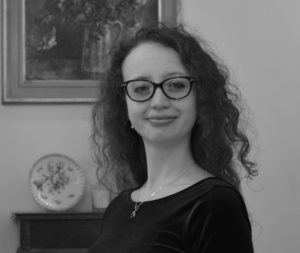
Rhiannon Randle (b. 1993) is an award-winning composer, violinist, soprano and emerging conductor based in London and Cambridge. A ‘distinctive theatrical talent’ (Stainer & Bell) who ‘turns anguish into art’ (Matthew Parris, The Times), drama is central to Rhiannon’s music – she has written three chamber operas, one in association with the Royal Opera House. Her music has been performed nationally and internationally, with commissions including for BBC Radio 3 International Women’s Day; BBC Singers; Dame Sarah Connolly; Britten Sinfonia; members of Allegri Quartet; the Choirs of King’s College; Trinity College; St. Catharine’s College, Cambridge and Christ Church Cathedral, Oxford; Choir of Royal Holloway and The Ebor Singers (York); Borough New Music Series; EQUATOR Women of the World (King’s Place); King’s Lynn; Orpheus & Bacchus (Bordeaux); and in the USA by Boston Opera Collaborative, and One Ounce Opera, Austin. Rhiannon is currently Associate Composer with Cambridge Graduate Orchestra – her latest orchestral tone poem, Chiron: The Teacher of Heroes was premiered in West Road Concert Hall, Cambridge as part of this year’s Cambridge Science Festival; Rhiannon’s orchestral nocturne Salt Deep will receive its premiere later this year. Selected for Psappha’s Composing for…scheme (2017-18), Rhiannon is writing for guzheng (Chinese zither) with forthcoming recording. She was a finalist in the Britten Sinfonia Composer Competition 2015 adjudicated by Judith Weir. Chamber music is a particular interest: Rhiannon’s first string quartet, Walking on Purple, has been recorded by her own award-winning Fourier Quartet.
After Door, Rhiannon produced and directed her second opera in Cambridge: Dido is Dead tells the myth of Dido and Aeneas through the eyes of the maddened heroine. Rhiannon’s first opera, Temptations, was a collaboration with best-selling poet Rev. Dr. Malcolm Guite, in Cambridge, reimagining Satan’s temptations of Jesus in a modern setting, and was praised by Sir Harrison Birtwistle. Other theatrical works include Lie There Dead, a drama for tenor, baritone and ensemble, and recent Duruflé Trio commission The Bitterness of Salt for soprano, flute, viola and piano.
Rhiannon's choral works have been described as adventurously expressive but singable (Richard Causton). She was commissioned by BBC R3 for International Women’s Day 2015: Like A Singing Bird premiered live on The Choir by Sarah Connolly and the Girl’s Choir of St. Catharine’s, Cambridge. She was a finalist in National Centre of Early Music Composer Award 2017, and a second performance of her Ave Regina by the Ebor Singers was featured in ‘Women of Note’, part of York Late Music series. Her On Life’s Dividing Sea was a finalist in the ORTUS International New Music Competition, New York and has recently been recorded by the BBC Singers. O Magnum Mysterium, commissioned by Choir & Organ, was premiered by Royal Holloway Choir, published online in Choir & Organ New Music Series, and a feature on Rhiannon appeared in the January/February 2017 edition of the magazine. Rhiannon is the inaugural Composer-in-Residence at St. Michael’s, Cornhill (2017-18); commissions include memoria for choir and erhu (Chinese fiddle); a communion motet; a Canticles setting and an anthem for The Drapers’ Company. Other recent commissioners include Girton College for their 150th Anniversary; Ronald Corp and the New London Children’s Choir; and the Zürich Chamber Singers. Her choral music is published by Stainer & Bell.
Rhiannon is an alumna of Girton College, Cambridge (BA Music and MPhil Composition), where she studied with Richard Causton; Jeremy Thurlow and Giles Swayne, and was a Leverhulme Arts Scholar at Guildhall School of Music & Drama on the innovative Opera Making & Writing MA, graduating with Distinction. Rhiannon currently supervises harmony, counterpoint and related compositional subjects at Cambridge University. She studies with Julian Anderson in London.
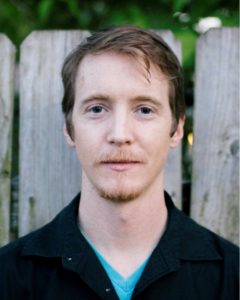
Robert LeBas appreciates the exceptional musicianship and innovation of One Ounce Opera. The adventurous group continues to explore new ways of experiencing and performing opera. Robert first began singing in choir and musical theater in his hometown of Amarillo, TX. He received his Bachelor's of Vocal Performance degree from the University of North Texas. Since moving to Austin, he has also performed with Good Shepherd Choir, Austin Opera, Austin Cantorum, and the Austin Gilbert & Sullivan Society. When not singing, he can also be found going on adventures with his dogs, biking around Austin, or climbing rocks. Robert would like to thank his family and his wife Danika, for their love and support.
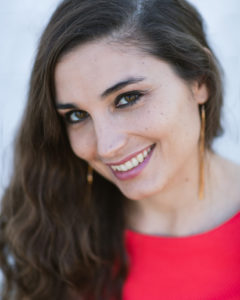 Mezzo-soprano Julie Silva has a passion for bringing music and characters to life on stage, particularly when reaching new audiences with innovative performances. Julie is thrilled to be performing the role of Mary in the American premiere of Door on this year’s Fresh Squeezed Ounce of Opera. Julie has had a lively 2017-2018 season with live soloist and televised performances with the iSING! International Young Artists Festival and Suzhou Symphony Orchestra in China, sharing arias with opera’s youngest fans through Austin Opera’s “Opera Treasure Chest” school outreach series, and recent performances as Annio in LOLA’s La clemenza di Tito: A Retelling. In May, Julie is excited to travel to Mississippi to perform as Countess Malcolm in A Little Night Music with the Natchez Festival of Music.
Mezzo-soprano Julie Silva has a passion for bringing music and characters to life on stage, particularly when reaching new audiences with innovative performances. Julie is thrilled to be performing the role of Mary in the American premiere of Door on this year’s Fresh Squeezed Ounce of Opera. Julie has had a lively 2017-2018 season with live soloist and televised performances with the iSING! International Young Artists Festival and Suzhou Symphony Orchestra in China, sharing arias with opera’s youngest fans through Austin Opera’s “Opera Treasure Chest” school outreach series, and recent performances as Annio in LOLA’s La clemenza di Tito: A Retelling. In May, Julie is excited to travel to Mississippi to perform as Countess Malcolm in A Little Night Music with the Natchez Festival of Music.
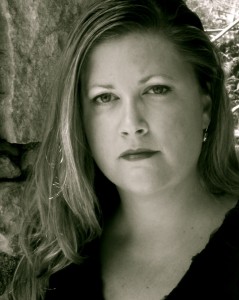 Founder and CEO of One Ounce Opera, Julie Fiore has enjoyed a lifetime of performance and stage work. Possessing an “energetic and richly beautiful soprano voice”, favorite roles include Abigail in Robert Ward's The Crucible and Sister Constance in Poulenc's Dialogues of the Carmelites. Prior to founding OOO, she served as an Artist-In-Residence and Assistant Director of Taos Opera Institute (NM), and Co-Director of Amarillo Opera's Summer Opera Camp. In Austin, Julie has created and performed new works and classical re-imaginations as part of the Fusebox Festival, Soundspace at the Blanton Museum, the City of Austin's People's Gallery, East Austin Studio Tour, South By Southwest Music Festival, Thinkery21, Beerthoven Recital Series, and OOO's Fresh Squeezed Ounce series, among others. Julie has a private voice and piano studio and is a Senior Music Mentor for Kids In a New Groove. She has a Bachelor of Music from University of North Texas and a Master of Music from University of Denver Lamont School of Music.
Founder and CEO of One Ounce Opera, Julie Fiore has enjoyed a lifetime of performance and stage work. Possessing an “energetic and richly beautiful soprano voice”, favorite roles include Abigail in Robert Ward's The Crucible and Sister Constance in Poulenc's Dialogues of the Carmelites. Prior to founding OOO, she served as an Artist-In-Residence and Assistant Director of Taos Opera Institute (NM), and Co-Director of Amarillo Opera's Summer Opera Camp. In Austin, Julie has created and performed new works and classical re-imaginations as part of the Fusebox Festival, Soundspace at the Blanton Museum, the City of Austin's People's Gallery, East Austin Studio Tour, South By Southwest Music Festival, Thinkery21, Beerthoven Recital Series, and OOO's Fresh Squeezed Ounce series, among others. Julie has a private voice and piano studio and is a Senior Music Mentor for Kids In a New Groove. She has a Bachelor of Music from University of North Texas and a Master of Music from University of Denver Lamont School of Music.
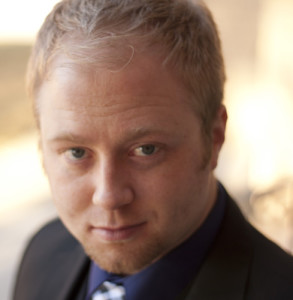
While studying for pre-med in his undergraduate work at Midwestern State University, Dalton Flake discovered the world of opera. His roles include: Borsa in Rigoletto; Rinuccio in Gianni Schicchi; Alfred in Die Fledermaus; and Detlef in The Student Prince. He then attended Texas State University for his Masters of Voice Performance. Where he added: Kaspar in Amahl and the Night Visitors; Candide in Candide; Sam Kaplan in Street Scene; Rodolfo in La Boheme; Charlot in Angelique, which went to win awards with the National Opera Association; E.T.A. Hoffmann in Le Contes d’Hoffmann; Abbe in Felice, and 1st boy in Trouble in Tahiti. He has been a soloist for Texas State in there performances of Monteverdi’s Vespers and Mendelssohn’s Elijah. Dalton has earned first place at NATS and won the Didzun Honors Award for excellence. Recently, Dalton performed Rodolfo in Puccini’s La Bohemewith Red River Lyric Opera. He thanks God and his wife and kids for allowing him the luxury of being a performer.
FSOO Composer Spotlight: Tony Solitro and the Cast of "She's Fabulous"
 One Ounce Opera is happy to introduce you to Tony Solitro, composer/librettist of "She's Fabulous," a Fresh Squeezed Ounce of Opera 2018 winner. Soprano Julia Watkins-Davis (Clarice) and Mezzo-soprano Patricia Combs (Bethel) -- who will breathe life (and laughter!) into the piece -- had these questions for Tony:
One Ounce Opera is happy to introduce you to Tony Solitro, composer/librettist of "She's Fabulous," a Fresh Squeezed Ounce of Opera 2018 winner. Soprano Julia Watkins-Davis (Clarice) and Mezzo-soprano Patricia Combs (Bethel) -- who will breathe life (and laughter!) into the piece -- had these questions for Tony:
1. I really enjoy singing this piece. I understand that part of the inspiration may have come from a Funny or Die video. Could you walk us through your composition process for this piece? How did you come up with the character names?
The idea to adapt Jack Neary’s play came from Greg Smucker and Trish Weinmann (Artistic Directors of Boston Opera Collaborative). They sent several short plays and asked if any resonated with me. When I read the script, Clarice and Bethel seemed so familiar to me. I adore all the over-the-top opera singers in my life, even when they are being total divas. I poke fun at singer-culture throughout the vignette, but it always comes from a place of love.
The original play is sharp and concise. When the ladies banter and echo one another, it's also quite musical. I seized every opportunity that allowed the characters to sing together. (I'm always on the lookout for these moments, but they are rare in plays). These qualities are all built into the source material, so the process felt very organic.
2. Do you compose at the piano? Or do you use Digital Performer, Logic, or ProTools to sequence the music, or go old-school with manuscript paper and then to Sibelius or Finale to render it?
I composed most of She’s Fabulous at the piano and penciled it on old-school manuscript paper. I wrote it during a residency at VCCA in Virginia. My studio had a lovely grand piano—a luxurious step up from my trusty keyboard at home—and wanted to take full advantage of it. (I don’t work this way on every piece. I often prefer to balance my work at the piano with abstract techniques. Drawing shapes and contours. Mapping out rhythmic and harmonic patterns. Writing prose.) Each evening, I engraved the day’s work in Finale.
I surprised myself with this piece. The concept was clear to me from the moment I read the play. The muse took over, and the realization felt inevitable. I typically trudge through several sketches and drafts. I refine ideas through a slow, methodical, and labor-intensive revision process. The final score for She's Fabulous materialized with uncharacteristic immediacy and clarity. This is me at my least self-conscious. I remember worrying about the pastiche audition arias and the zany “Congratulations†waltz. Comedy is particularly challenging … I’d work alone all day, then step out of my studio humming the tunes and chuckling to myself. I wasn’t sure if anybody else would find it funny. When I heard the audience’s reaction opening night, I was glad I didn’t second-guess my choices.
3. I noticed that, for the most part, this piece was written very conversationally. How long did it take you to get the rhythms just right?
There’s an ideal balance that I want to achieve. If it is too conversational, the whole thing sounds like recitative. The voice can’t shine in that context, and it’ll be boring for the audience. If I sacrifice prosody for the sake of the music, then I’m disrespecting the text. It weakens the theatrical experience if the words are unintelligible.
John Steinbeck gave some wise advice. “If you are using dialogue—say it aloud as you write it. Only then will it have the sound of speech.†Even though I’m not a vocalist, I sing through everything with a metronome. (Gotta make sure I can get the words out at tempo and find my note in the chord!) From the beginning, I make it a priority to honor natural speech patterns. Then, I can make music. Stretch things out. Energize the rhythmic profile. Play with articulation.
4. I was wondering if you were interested in composing more “mini-operas†with Clarice and Bethel, since Jack Neary has at least six ten-minute plays...
I have a lot of fun with the mini-opera genre. It's been a satisfying creative outlet for me. Boston Opera Collaborative presents a popular “Opera Bites†program each November. Our first collaboration was She’s Fabulous in 2016. They subsequently commissioned Triangle in 2017, and we have an exciting project in the works for 2018. I am certain more vignettes are in my future—but I have no plans (yet) to adapt another from the Clarice/Bethel series. Should the opportunity present itself, I’d happily revisit them. Jack’s writing is brilliant, and these characters hold a special place in my heart.
Watch an One Ounce Opera live performance of She's Fabulous on YouTube!
_____
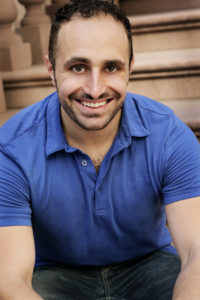
Tony Solitro is composer of concert and stage music whose recent works have been commissioned by Boston Opera Collaborative, Joseph Conyers (Assistant Principal Bass, Philadelphia Orchestra), the Institute of Contemporary Art, Philadelphia, and Network for New Music. His compositions have been performed by People Inside Electronics (Los Angeles), the Litha Symphony Orchestra (Manhattan), International Opera Theater (USA/Italy), and in venues such as the Red Note New Music Festival (Illinois State University), the Royal Northern College of Music (Manchester, England), and the International Guitar Research Centre (University of Surrey, Guildford, UK). Tony has been awarded fellowships from Yaddo, VCCA, Brush Creek, Kimmel Harding Nelson, and the Brevard Music Center. He earned his Ph.D. (University of Pennsylvania) as a recipient of the George Crumb Music Fellowship and his M.M. (Longy School of Music) on a Nadia and Lili Boulanger Scholarship. To hear recordings, see videos, and explore his composition catalogue, visit www.tonysolitro.com.
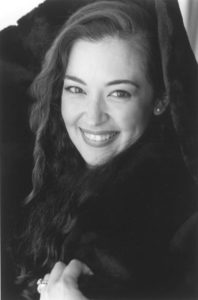
Julia Watkins-Davis has been praised for her"fiery coloratura" and"outstanding musicianship and gift of interpretation" as a classical performer. In the 2017-2018 Season, she will perform Donna Anna in Don Giovanni with Texas Concert Opera Collective, and debut in a winning mini-opera with One Ounce Opera’s “Fresh Squeezed Ounce of Opera." Credits include work with Austin Opera; Los Angeles Opera and their Community Education Department; Glimmerglass Opera; the Geffen Playhouse in Los Angeles; South Bay Opera; Orange County Opera; Pacific Music Festival in Sapporo, Japan; and the Altenburg Musik Festival in Germany. Not confined to traditional classical endeavors, Julia has recorded with emerging popular artists, voiced regional commercials and performed featured solos for film and television soundtracks, including HBO's Carnivà le and Virtual Obsession for ABC/Von Zerneck-Sertner Films. For the title theme to The Forgotten City, she served as both singer and co-composer. Julia Watkins-Davis was awarded the Grand Prize at the national finals of the Bel Canto Vocal Scholarship Foundation. She has also been honored as a district winner of the Metropolitan Opera National Council Auditions in Southern California, recognized by the National Association of Teachers of Singing (NATS), the Young Musicians Foundation, the Palm Springs Opera Guild, the Loren L. Zachary Society and the Opera Buffs of Southern California.
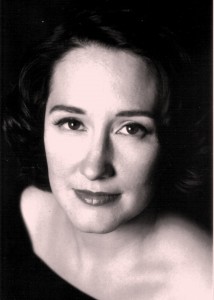
Patricia Combs, mezzo soprano, loves singing a wide variety of music, but excels in French literature, zarzuelas, and loves the challenges of contemporary works as well as chamber music. She will be playing the role of Dame Hannah in Ruddigore this summer with the Gilbert & Sullivan Society of Austin. Her roles include Alisa in Lucia di Lammermoor, Bianca in The Rape of Lucretia, Meg Page in Falstaff, Mrs. Zilkov in The Manchurian Candidate and Dinah in Trouble in Tahiti. She studied with Dr. Hugh Cardon, Rose Taylor, Cindy Sadler, and Cynthia Moellenhoff. She holds a Bachelors of Music Education from UT-El Paso and a Masters in Vocal Performance from UT-Austin.
FSOO Composer Spotlight: Timothy Ayres-Kerr and "A Game of Werewolf"
 ...and what a game it will be! Composer/librettist Timothy Ayres-Kerr takes singers Angela Irving, Andy Fleming, Dalton Flake, Jake Jacobsen, Jenny Ohrstrom, and Patricia Combs on a fast-paced journey of who-done-it, in the Fresh Squeezed Ounce of Opera 2018's winning work A Game of Werewolf. The cast had these questions for Tim:
...and what a game it will be! Composer/librettist Timothy Ayres-Kerr takes singers Angela Irving, Andy Fleming, Dalton Flake, Jake Jacobsen, Jenny Ohrstrom, and Patricia Combs on a fast-paced journey of who-done-it, in the Fresh Squeezed Ounce of Opera 2018's winning work A Game of Werewolf. The cast had these questions for Tim:
1. We noticed that what drives the villagers most is fear. Were you inspired by our current political climate to write this piece?
The actual game (Werewolf / mafia ) is all about suspicion and persuading the masses to trust and support you against someone else. The phycological and political issues it’s gameplay builds on are such real world elements that it would be impossible for a dramatization of it to not relate. I painstakingly tried to avoid taking a stance that too easily aligned with either major “Sides” of current politics. Instead, my aim is that this piece will challenge everyone of every ideology to question their belief systems and dogmas.
2. How long did it take you to write the piece? Did you workshop it with singers as part of the process?
I began work on GOW in June of 2017 working exclusively on the libretto. It was mostly finished by the end of that month. July and august I went about setting it. It was in a complete form by September when rehearsals started. I'm a singer first, and so my approach to writing was largely based on me singing something, recording it as a voice memo, then later transcribing it. With every single phrase, I would mull over it for about 10/15 minutes (usually while doing some other chore) and if i couldn't commit it to memory and sing it, I would make significant edits. The work was performed several times by my own company as a curtain raiser for WholeTone Opera's own Werewolf opera and you could consider that a workshop, as so much was learned about the piece in that process.
3. This opera reminds a lot of us of Gilbert & Sullivan, but gone dark. Have you drawn inspiration from G&S? What other composers do you draw inspiration from?
Most of my stage experience to date is G&S and I the influence is unshakable. I consider Arthur Sullivan to be one of the greatest setters of intelligible English text, and definitely tried to emulate him. The way certain characters make light of gave occurrences reads to me incredibly Victorian.
I listen to system of a down on occasion, and imagined some of that tonality for Gadruna's first lines of music (weird i know lol). The aggressive rhythmic figures they use really blow my mind. I was also pulling inspiration from an obscure music hall form I'm currently studying. You can hear a recording of it here: https://www.youtube.com/watch?
4. Did you have someone in mind as the werewolf when you wrote the piece?
I may have at one point. I planned on some sort of big reveal near the end of the story, but as I wrote, the werewolf took on a much more metaphorical quality, even though it is a real thing. The Werewolf’s motivic language can be found accompanying characters at their most sinister moments. While this was a handy musical tool, I believe it to be central to the piece’s overall message. The undertaker says it best:
"Now I know what you're all thinking and I say it isn't so-
The Werewolf isn't me, it's true!
So at risk of causing panic I'll inform of what I know-
The Werewolf could be any one of you!"
Watch an One Ounce Opera live performance of A Game of Werewolf on YouTube!
_______________
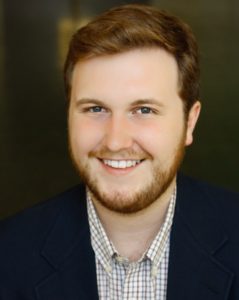 Timothy Ayres-Kerr BM is a recent graduate of New England Conservatory of Music and a former student of Bradley Williams. While studying at the Conservatory he performed as a soloist in Opera, Oratorio, and discovered a particular love of British and American Operetta, performing several lead tenor roles in the works of Gilbert & Sullivan, Most notably Frederic in The Pirates Penzance. Of a recent performance of his, the Boston Musical Intelligencer noted that "He sang with purity and conviction, enunciated perfectly, and acted without a touch of guile." Timothy is currently studying for an MM in vocal pedagogy with Ian Howell at the New England Conservatory while continuing to Run his own miniature opera company, the Parlour Opera Players. Timothy has been writing vocal music almost as long as he has been singing, working primarily on short comic operas and Cantatas. A Game of Werewolf is Timothy’s second completed opera. He is passionate about opera in English, whether it be new or old.
Timothy Ayres-Kerr BM is a recent graduate of New England Conservatory of Music and a former student of Bradley Williams. While studying at the Conservatory he performed as a soloist in Opera, Oratorio, and discovered a particular love of British and American Operetta, performing several lead tenor roles in the works of Gilbert & Sullivan, Most notably Frederic in The Pirates Penzance. Of a recent performance of his, the Boston Musical Intelligencer noted that "He sang with purity and conviction, enunciated perfectly, and acted without a touch of guile." Timothy is currently studying for an MM in vocal pedagogy with Ian Howell at the New England Conservatory while continuing to Run his own miniature opera company, the Parlour Opera Players. Timothy has been writing vocal music almost as long as he has been singing, working primarily on short comic operas and Cantatas. A Game of Werewolf is Timothy’s second completed opera. He is passionate about opera in English, whether it be new or old.
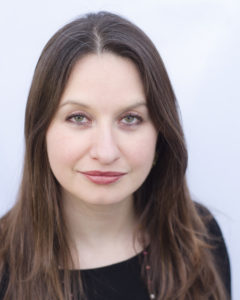 Angela Irving is a multifaceted singer who enjoys molding young HS-aged minds and voices. She currently teaches 65 wonderful young people at Bowie, Lake Travis, and McCallum High Schools. Angela performs with One Ounce Opera, Austin Opera, Gilbert & Sullivan Society of Austin, and as the soloist at the Christian Science Church downtown. Some recent roles are The Plaintiff/Angelina in Trial By Jury (Gilbert & Sullivan Austin); Fortuna in L’Incoronazione di Poppea (One Ounce Opera); Tessa in The Gondoliers (GSA); and Melissa in Princess Ida (GSA). Angela premiered the song cycle “Five Mystic Songs” by David Adams with string quartet at OOO’s Fresh Squeezed Ounce of Art Song in 2016, and has enjoyed premiering art songs and musicals by Rain Nox, Jonathan Geer, Michael Nesline/Steve Saugey, Fred Fisher, and, while at the University of North Texas, many, many others.
Angela Irving is a multifaceted singer who enjoys molding young HS-aged minds and voices. She currently teaches 65 wonderful young people at Bowie, Lake Travis, and McCallum High Schools. Angela performs with One Ounce Opera, Austin Opera, Gilbert & Sullivan Society of Austin, and as the soloist at the Christian Science Church downtown. Some recent roles are The Plaintiff/Angelina in Trial By Jury (Gilbert & Sullivan Austin); Fortuna in L’Incoronazione di Poppea (One Ounce Opera); Tessa in The Gondoliers (GSA); and Melissa in Princess Ida (GSA). Angela premiered the song cycle “Five Mystic Songs” by David Adams with string quartet at OOO’s Fresh Squeezed Ounce of Art Song in 2016, and has enjoyed premiering art songs and musicals by Rain Nox, Jonathan Geer, Michael Nesline/Steve Saugey, Fred Fisher, and, while at the University of North Texas, many, many others.

While studying for pre-med in his undergraduate work at Midwestern State University, Dalton Flake discovered the world of opera. His roles include: Borsa in Rigoletto; Rinuccio in Gianni Schicchi; Alfred in Die Fledermaus; and Detlef in The Student Prince. He then attended Texas State University for his Masters of Voice Performance. Where he added: Kaspar in Amahl and the Night Visitors; Candide in Candide; Sam Kaplan in Street Scene; Rodolfo in La Boheme; Charlot in Angelique, which went to win awards with the National Opera Association; E.T.A. Hoffmann in Le Contes d'Hoffmann; Abbe in Felice, and 1st boy in Trouble in Tahiti. He has been a soloist for Texas State in there performances of Monteverdi's Vespers and Mendelssohn's Elijah. Dalton has earned first place at NATS and won the Didzun Honors Award for excellence. Recently, Dalton performed Rodolfo in Puccini's La Boheme with Red River Lyric Opera. He thanks God and his wife and kids for allowing him the luxury of being a performer.
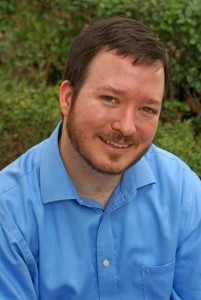
Having completed his MM in Vocal Performance at UT’s Butler School of Music, Andy Fleming continues to be involved in opera around Austin. Andy has performed roles with Gilbert and Sullivan Austin (Trial by Jury, Cox and Box, The Zoo), and even stepped into the pit for one production of Gondoliers. Critics have remarked that Andy “was there, too.” He has also performed with Spotlight on Opera (Hansel and Gretel, Die Zauberflöte, Cosí fan tutte), Opera Piccola (Abduction from the Seraglio), and One Ounce Opera (There's Beauty in the Beast, Love After the Collapse of Civilization, Ho! Ho! Ho!, Problems), and can be seen in the chorus of Austin Opera’s upcoming La Traviata.

Patricia Combs, mezzo soprano, loves singing a wide variety of music, but excels in French literature, zarzuelas, and loves the challenges of contemporary works as well as chamber music. She will be playing the role of Dame Hannah in Ruddigore this summer with the Gilbert & Sullivan Society of Austin. Her roles include Alisa in Lucia di Lammermoor, Bianca in The Rape of Lucretia, Meg Page in Falstaff, Mrs. Zilkov in The Manchurian Candidate and Dinah in Trouble in Tahiti. She studied with Dr. Hugh Cardon, Rose Taylor, Cindy Sadler, and Cynthia Moellenhoff. She holds a Bachelors of Music Education from UT-El Paso and a Masters in Vocal Performance from UT-Austin.
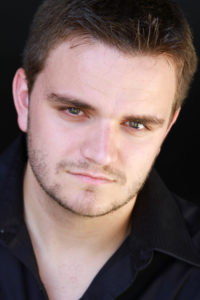
Jake Jacobsen, baritone, is a founding member of OOO and is excited to be performing in his third FSOO production. Jake is a graduate of the Butler School of Music, earning a Masters of Music in 2011, and a Doctor of Musical Arts degree in 2015. Jake has performed with several professional organizations in the
Austin Area in addition to OOO, including Conspirare, Austin Opera, and the Gilbert & Sullivan Society, where he performed the role of Samuel in their production of The Pirates of Penzance last season. At the end of this month, Jake will be performing in the chorus of Austin Opera’s production of La Traviata, and will be in the G&S Society’s production of Ruddigore in June.
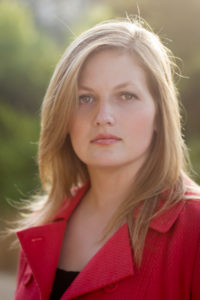
Jenny Ohrstrom's recent performances include Helena in Ho! Ho! Ho! and Voodoo Priestess in The Stranger the Better with One Ounce Opera, and Carmen with Austin Opera. Other highlights include Fiordiligi in Così fan tutte, Miss Pinkerton in The Old Maid and the Thief, Santuzza in Cavalleria Rusticana, Dido in Dido and Aeneas, Mother in Hansel and Gretel, and the title role in Alcina. Jenny holds a Master of Music in Voice Performance from California State University-Northridge and a Bachelor of Music in Voice Performance from Central Washington University in Ellensburg, Washington. She is a winner of CSUN’s and CWU’s Concerto Competitions, and a recipient of the Village Voices Chorale Scholarship, Nancy Hooker Scholarship, NATS-LA Summer Study Grant, CSUN Graduate Research Fellowship, and the CSUN Graduate Fellowship for Outstanding Research and Creative Activity. Keep up with Jenny at www.jennyohrstrom.me
The Winners: Announcing FSOO 2018 Short Opera Selections
After an international submission process, One Ounce Opera announces Fresh Squeezed Ounce of Opera Selections for 2018. The third annual short opera festival takes place April 6-8 in Austin, Texas at the Museum of Human Achievement.
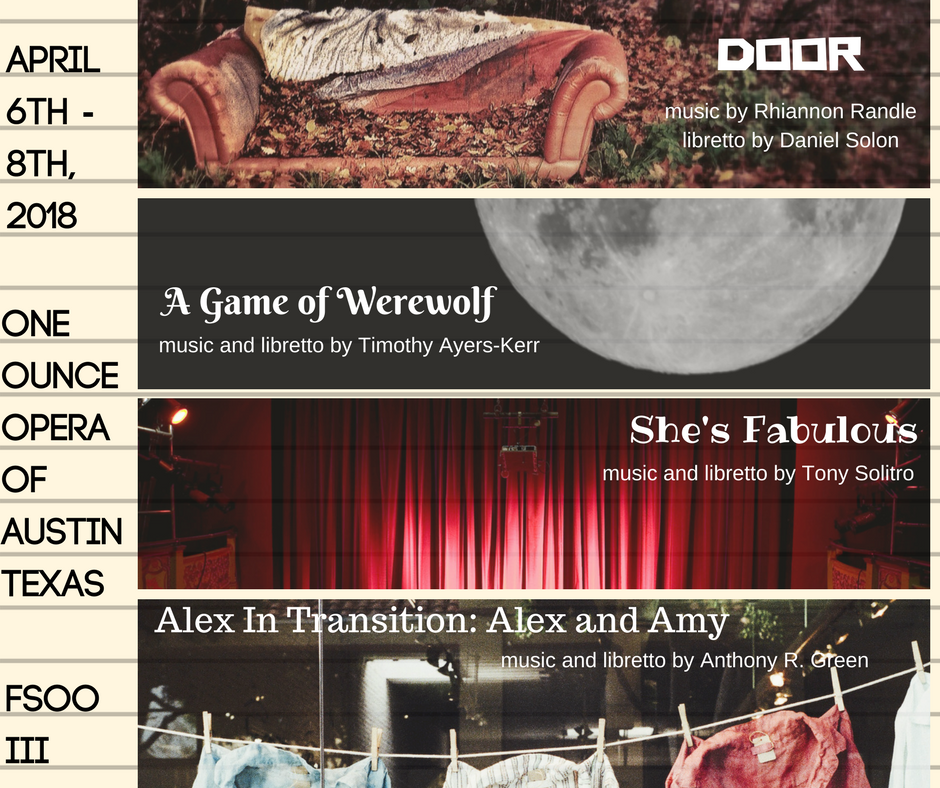
This year’s winning selections are:
- DOOR – music by Rhiannon Randle, libretto by Daniel Solon
- She’s Fabulous – music and libretto by Tony Solitro
- Alex In Transition: Transition II: Alex and Amy – music and libretto by Anthony R. Green
- A Game of Werewolf – music and libretto by Timothy Robert Ayres-Kerr
Directed by Daniel Solon. Produced by Julie Fiore. Collaborative Pianist is Graham Yates. Technical Director is Gus Sterneman.
Sung by One Ounce Opera Members Patricia Combs, Julie Fiore, Dalton Flake, Andy Fleming, Angela Irving, Jake Jacobsen, Robert LeBas, Charissa Memrick, Jenny Ohrstrom, Julie Silva, Julia Watkins-Davis, and Veronica Williams.
Tickets will go on sale soon. Be the first to know — SIGN UP FOR OUR NEWSLETTER!
Follow One Ounce Opera on Facebook, join the Facebook event, and bookmark the FSOO-III page for the latest information on OOO’s flagship series. Cheers!
Meet FSOAS '17 Winning Composer Douglas Fisk
We'd like to introduce Douglas Fisk, whose winning song cycle Banjo and Shadows sets Carl Sandburg's stirring poetry in motion. OOO's Jake Jacobsen has been preparing the piece for the 2nd Annual Fresh Squeezed Ounce of Art Song, and had these questions for the composer:
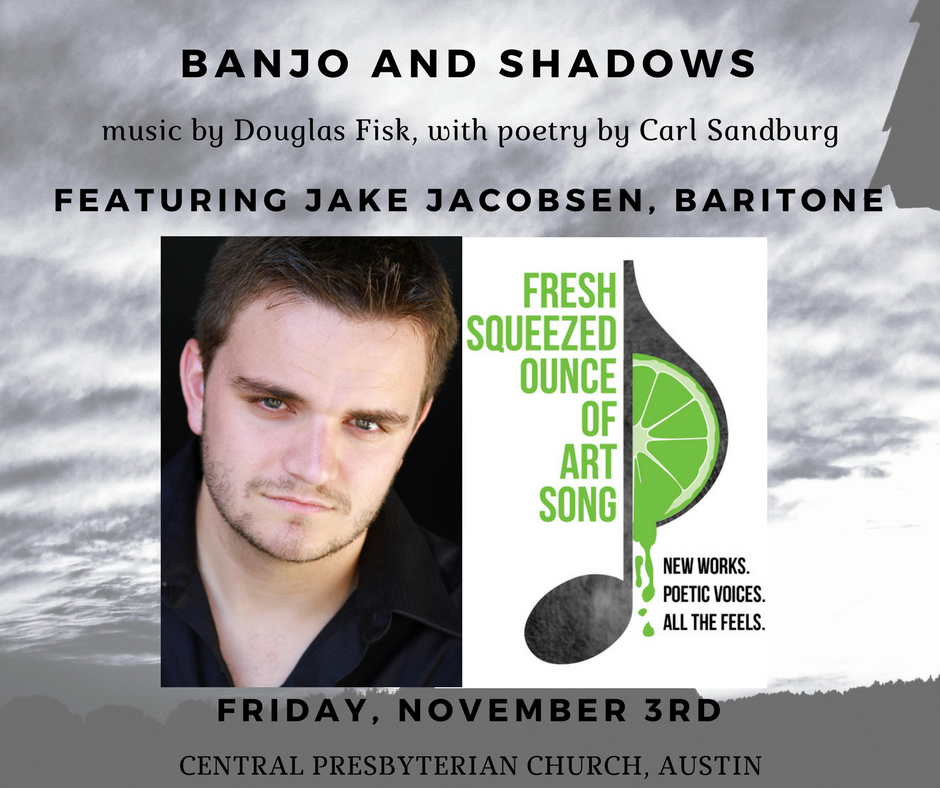 Jake: Sandburg's Chicago Poems compilation must contain at least one hundred poems. How and why did you select the ones you did?
Jake: Sandburg's Chicago Poems compilation must contain at least one hundred poems. How and why did you select the ones you did?
Douglas: I set about finding a series of poems that created a certain dramatic/emotional arc from beginning to end. In terms of selecting one poem over another -- that's largely an intuitive process, whereby a poem either seems conducive to setting or not; it's a little hard to explain, but when you find a poem that works with what you're trying to do, you recognize it. I liked the idea of ending with the “Kreisler” poem, a reference to the great violinist Fritz Kreisler, with the poem’s last lines suggesting a continuation even at the end of the cycle.
Jake: What was the biggest challenge setting these pieces?
Douglas: Setting these poems came relatively quickly once I settled on the poems. The fourth poem used in the cycle, “From The Shore,” required a slightly different approach due to its greater length.
Jake: Have you set Sandburg's texts before? If not, do you see yourself coming back to this poet in the future?
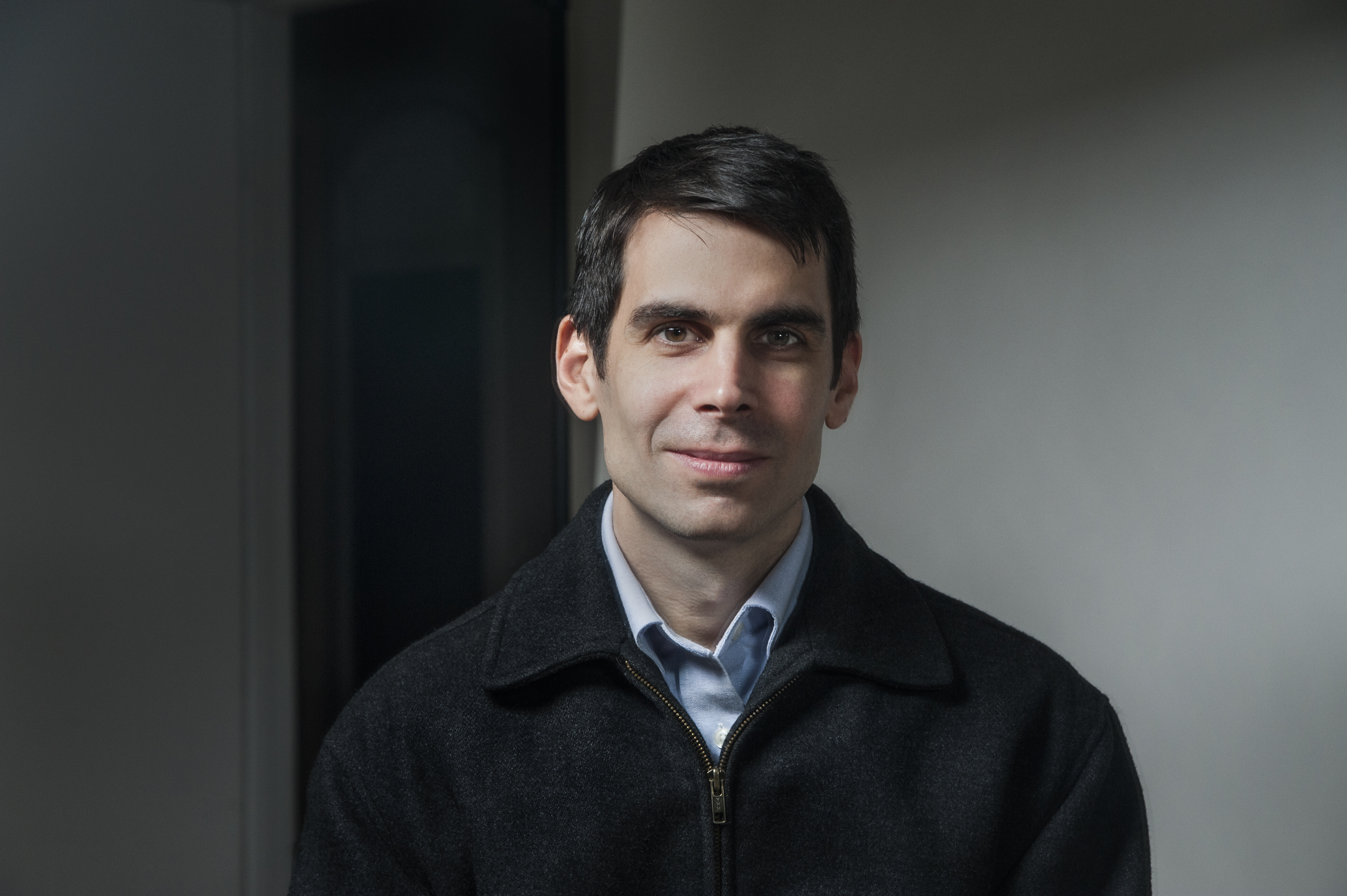
Douglas: Yes, in fact one of the earliest pieces I wrote when starting out as a composer was a setting of five other Sandburg poems from Chicago Poems, titled Sandburg Songs. That was written in 2002. Carl Sandburg was a poet I felt a connection with as I was growing up, and I had a copy of his collected poems that I'd read from regularly. I still feel that connection to his work, so it has felt natural to sometimes revisit his work when I’m looking for poetry to set.
Get your tickets to FSOAS '17 to hear Douglas' work in person!
____
Douglas Fisk is active as a composer, pianist, and teacher. His music has been performed by members of the New York New Music Ensemble, percussionist Gwendolyn Burgett, baritone Malcolm Merriweather, and Sospiro Winds. He has studied composition with Paul Barsom, Bruce Trinkley, Ezra Laderman, and Martin Bresnick. He received his MM and MMA degrees from the Yale School of Music. He has attended the Oregon Bach Festival Composers Symposium, the June in Buffalo festival, the European American Musical Alliance program in Paris, France, where he studied with Claude Baker, and been in residence at the Millay Colony for the Arts.
To find out more about Douglas, visit his website http://douglasfiskmusic.com.
Meet FSOAS '17 Winning Composer Kevin March
On Friday, November 3rd, One Ounce Opera will premiere an important piece -- Songs of Remembrance and Resistance -- at the 2nd Annual Fresh Squeezed Ounce of Art Song. OOO soprano Amy Selby, along with Veronica Williams, will perform the song cycle. Let's hear about it from Amy and composer Kevin March now.
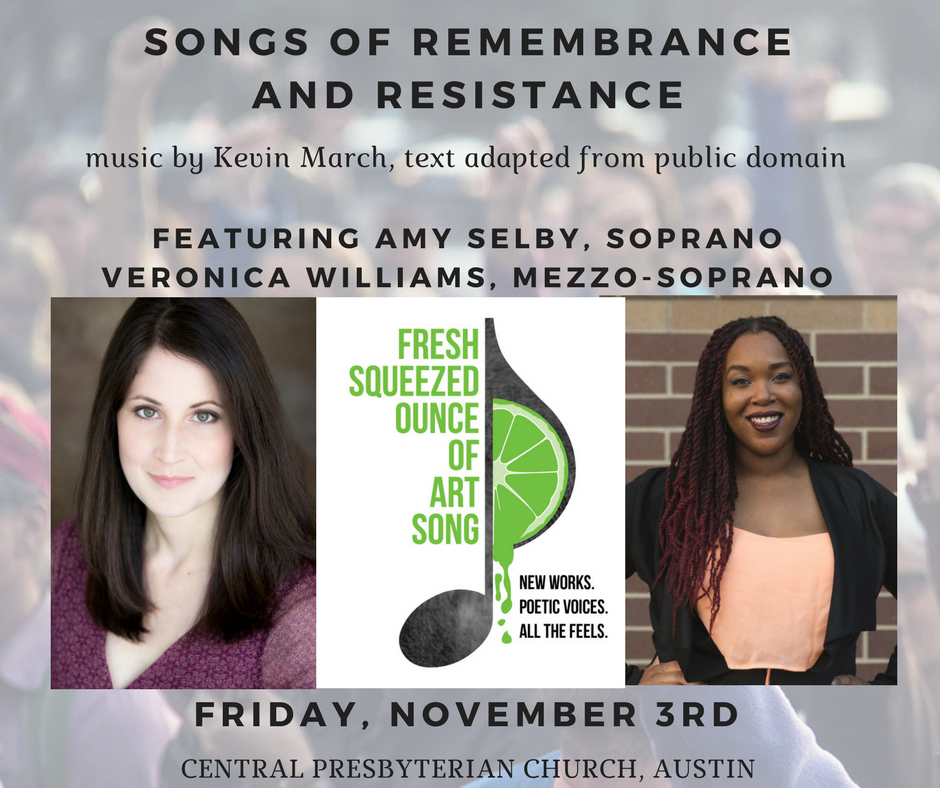 Amy: It will be a pleasure to perform your pieces from your set at One Ounce Opera's Fresh Squeezed Ounce of Art Song in a few weeks!
Amy: It will be a pleasure to perform your pieces from your set at One Ounce Opera's Fresh Squeezed Ounce of Art Song in a few weeks!
You mention in the score that, "Principled women taking principled action in the face of patriarchal warnings, persisting in spite of fear, harm or threat of harm, are to be found throughout recorded history and across cultures." Out of all of the women in history, what was it about these particular women that influenced you to choose to group them together in this set?
What composers, one living and one from the past, have had the most impact in helping you form your own style of composition? What particular features from their works inspire you?
Kevin: It’s a pleasure to have had my cycle chosen for the concert and to have it in your capable hands, or rather, voice. Thank you also for the thoughtful questions.
As to why I chose these particular women for the cycle: to put it quite simply, they saw one thing that was within their power to do and they did it. “I will save this life.” “I will resist this injustice.” “I will not accept this behaviour.” I found it remarkable that, for these women, their extraordinary responses seemed, to them, the obvious thing to do. That's both challenging and inspiring. I should also add that I have three more songs in various stages of completion, which will be added to the cycle later.
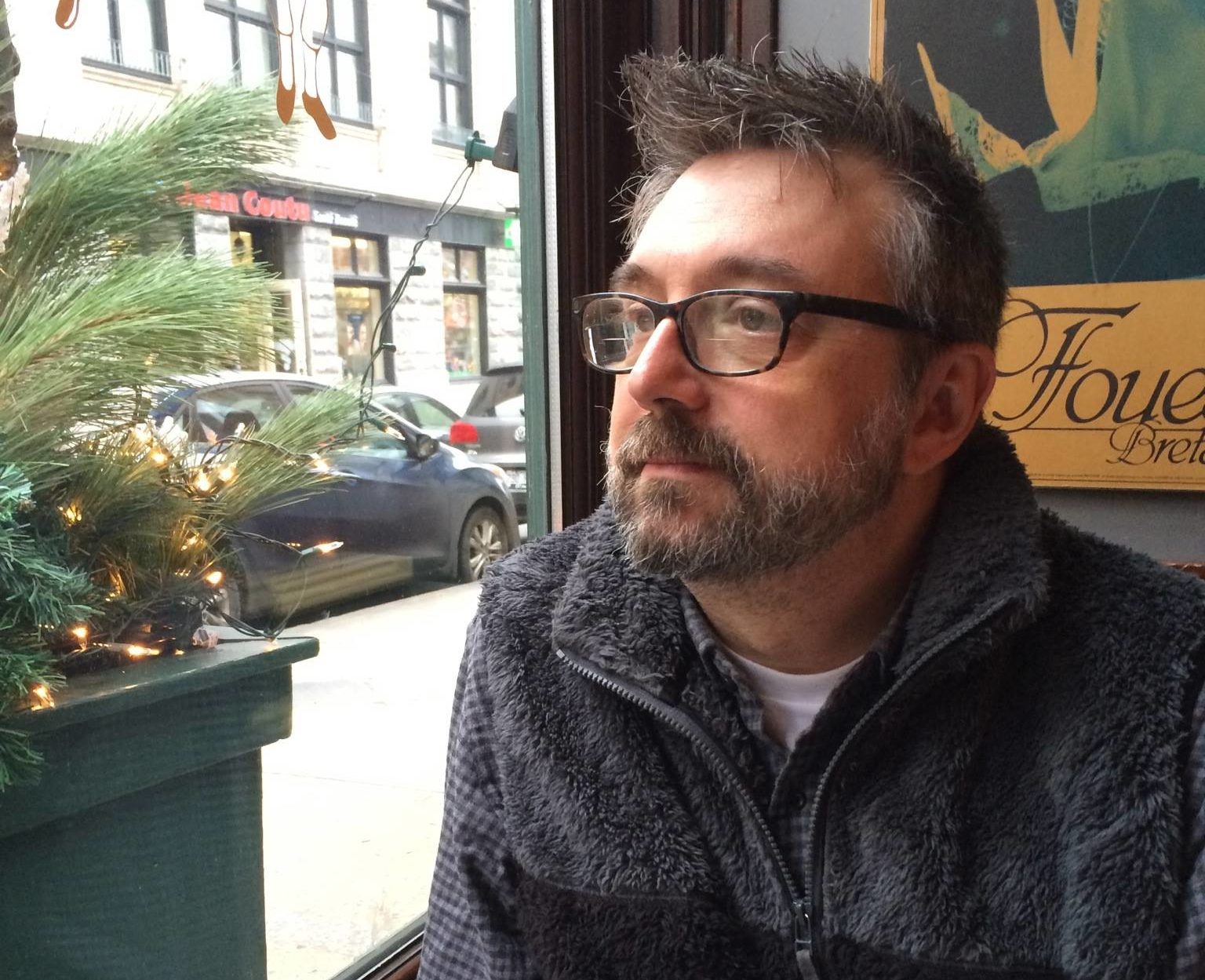
As for composers who’ve had an influence: with respect to my vocal music, the American composer William Bolcom, with whom I studied while I did my Masters and Doctorate at University of Michigan, and Claude Debussy are probably my biggest inspirations. Both are masters of text setting; both brilliantly employ every musical element to convey the text.
Experience Songs of Remembrance and Resistance on Friday, November 3rd!
_____
Kevin March is an award-winning, composer who’s works have been performed in North America, Australia, an Europe by Opéra de Montréal, Pacific Opera Victoria, the Tasmanian Symphony Orchestra, Orchestra Victoria, the New York City Opera, and numerous chamber ensembles and soloists.
His works have been featured in the Metropolis New Music Festival and the 7th Sydney Biennale. Awards include first prize in the 3MBS National Composer Awards for his orchestral work Kambarang and the Dorian La Gallienne Prize for Ophélie. His works have been broadcast on radio and featured in the ABC National documentary Modern Muses: The Greeks and New Music.
His opera, Les Feluettes (Lilies), commissioned by Opéra du Montréal premiered to sold-out audiences, standing ovations, and rave reviews in May 2016 and was subsequently nominated for a coveted Opus Award. It’s second production with Pacific Opera Victoria in April 2017 saw more full houses and standing ovations. The Edmonton Opera will give Les Feluettes its third production in 2017.
To find out more about Kevin, visit his website www.kevinmarch.com.au.
Meet FSOAS '17 Winning Composer Steven Serpa
Welcome back 2-time FSO winner Steven Serpa, Austin-based composer and singer. His winning short opera Thyrsis and Amaranth made the 2016 Fresh Squeezed Ounce of Opera program, and has been hailed as "powerfully emotional" and "truly beautiful....a magnificent story." Maureen, who played Amaranth, takes on Serpa once again, and along with OOO newcomer Chelsea DeLorenz, will breathe life into Steven's quirky song cycle The Creatures: A Bestiary Retold on Friday, November 3rd.
And now, with the help of Maureen and Chelsea, let's spotlight Steven and his work. Enjoy!
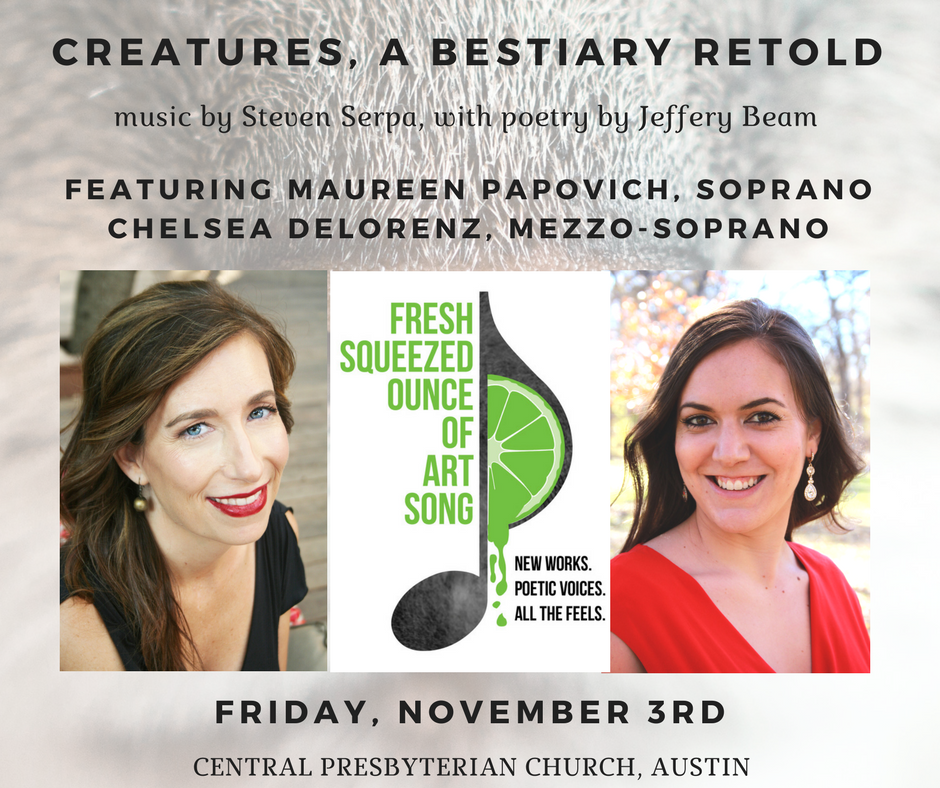 Maureen: I'm absolutely loving these pieces. I think my favorite thing about these songs is how dark parts of them are. So many songs about animals are cute and funny. I love how the poetry and music reflect a truer portrait of living beings (even the fantasy ones!)
Maureen: I'm absolutely loving these pieces. I think my favorite thing about these songs is how dark parts of them are. So many songs about animals are cute and funny. I love how the poetry and music reflect a truer portrait of living beings (even the fantasy ones!)
Anyhow, a couple of questions for you about your process with these pieces.
1. An obvious one is, how did you choose these particular 'beasts' to set?
2. I'm also curious what drew you to Jeffrey Beam's poetry to begin with. You speak in the notes about your relationship with Lee Hoiby - which is so interesting - and you talk about your love of Beam's poetry, but not how you came to find his work and what about it moves you?
Steven: Hi Maureen & Chelsea! I’m glad to hear from you and glad you’re enjoying the beast songs. I’m really looking forward to hearing what you do with these songs. After wrestling with the notes and rhythms on the bars of the music/cage, I’ve grown fond of these little monsters. Whether spikey or fuzzy, each animal has its beauty and light, their ugliness and darkness. I also think the Prologue is one of my favorite vocal things I’ve written! I’m looking forward to this.
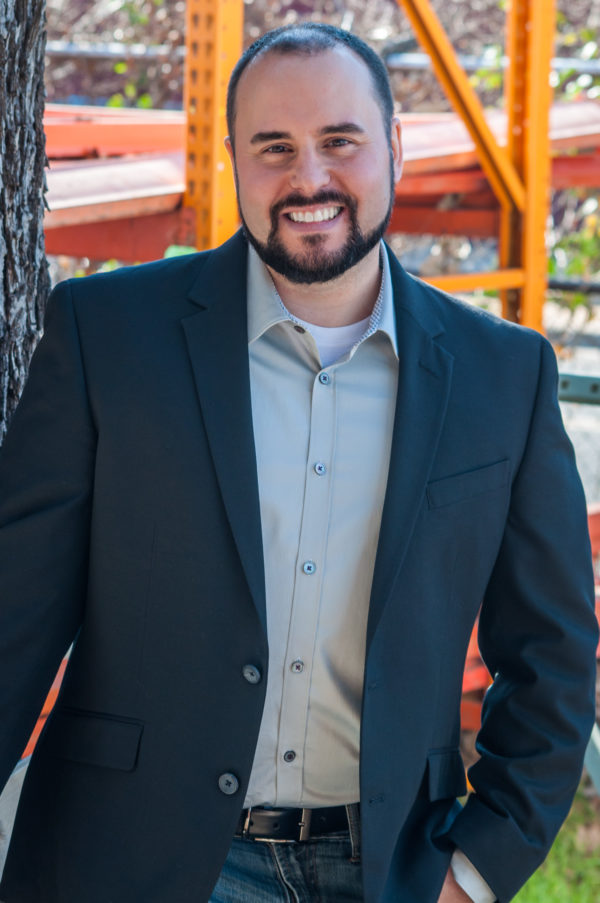
So 1st, these little monsters…
The Creatures is a work I have wanted to write for a bunch of years now. The poems are such entertaining gems. They are quirky mixtures of “scientific observation” and mysticism that Jeffery crafted from snippets of Elizabethan bestiaries. While Jeffery drew on the tradition of these medieval authors, I drew on the tradition of beast songs from the last century. So why did I choose the creatures I did? Some of the creatures I chose because composers before me had written really great works on them, like Poulenc’s Le Dromadaire or Cage’s Litany for the Whale. The others I was drawn to for the combination of myth and reality or of their beauty or power. Each creature has two sides, like all of us really: the Beaver has its sweet, playful quality but is also a crafty creature of the night– the Manticore is a dangerous man-eater with a radiant, clear voice.
So 2nd … What is it about Jeffery’s poetry…
The Creatures is actually my third work with Jeffery’s poetry. Last year the Austin Symphony Orchestra premiered my work An Invocation, a tone poem inspired by his poem of the same name. But the first time I came across his texts was in 2008 when I was writing a choral cantata for a World AIDS Day benefit in Boston. I was looking for text that possessed both memorial qualities but was also uplifting, and I found this absolutely perfect and inspiring poem:
Heaven’s hounds guard your ashes now
Shine their green light
on a humbled earth
For every gray stone
alive with moss and left
unturned by your kind feet
Heaven’s birds sing
That was my intro to Jeffery Beam’s work. Since then, I’ve extensively explored his poetry. It has inspired me and had me scheming new partnerships between his text and my music. On top of that, learning that Lee Hoiby, one of the best art song composers in the history of American song, learning that he had set Jeffery’s texts made me feel even more connected to the poetry. Lee was an early mentor to me. When I first started composing, he graciously looked over my songs and gave me words of criticism and support. I feel like these songs are a spiritual return to those early songs, and so I’ve dedicated them to Lee Hoiby’s memory.
Hear The Creatures come to life on Friday, November 3rd at 8pm!
_____
Steven Serpa is a composer whose music has won recognition with ensembles and opera companies across the United States, Canada and Europe. His work An Invocation was recently premiered by the Austin Symphony Orchestra and featured on the TreeFalls new music series in Spartanburg, SC. His one-act opera Thyrsis & Amaranth was premiered by Hartford Opera Theater in 2011 and has since been produced in Halifax, Cincinnati, Austin, St. Louis, and recently at Syracuse University. Critics praised Thyrsis as "Truly beautiful… a magnificent little story jammed full of thought and feeling and meaning" with “gorgeous music and wrenching lyrics.”
To find out more about Steven, visit his website http://serpamusic.com.
Meet FSOAS '17 Winning Composers Rodney Rawlings and Michael Scherperel
OOO's newest tenor, Brian Minnick, joins us to showcase two short songs by two contemporary composers, whose works prove inspiration can happen in places you least expect. Introducing When Matter Touches Antimatter by Rodney Rawlings and Up for #1 by Michael Scherperel! Here them premiere in Austin on Friday, November 3rd. Brian had these questions for the winning composers:
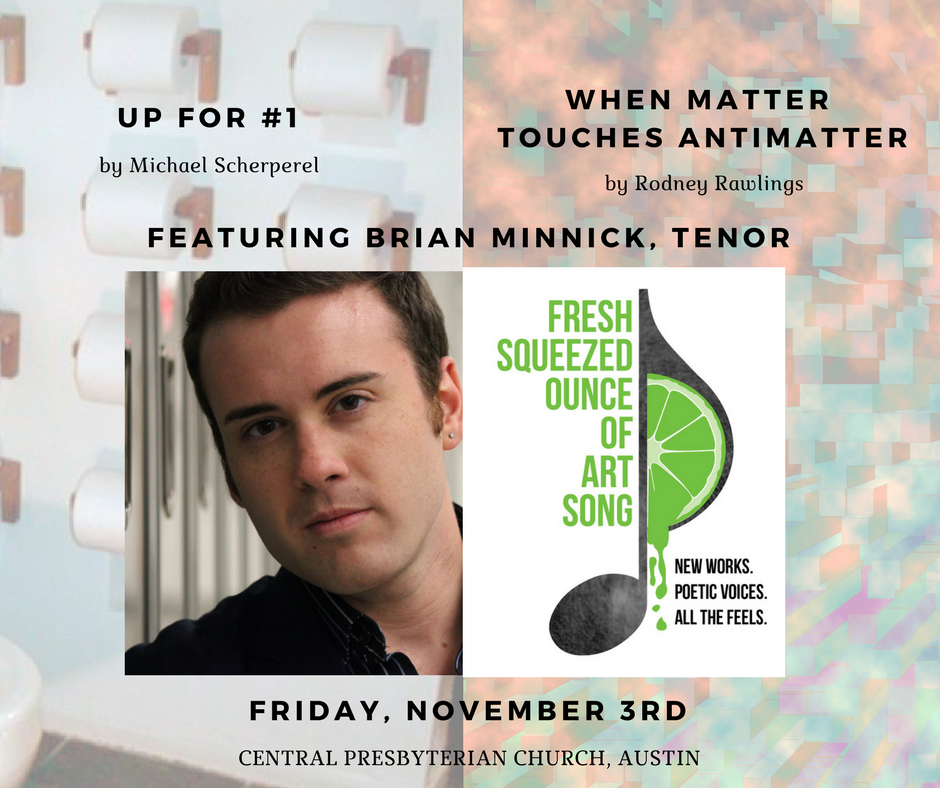 Brian: Rodney, most composers set their music to the poetry of other writers. What is it like to set your own text to music?
Brian: Rodney, most composers set their music to the poetry of other writers. What is it like to set your own text to music?
Rodney: Actually, with me the melody always comes first and I write the words to it. A few times, as in my “Ave Maria (Ellen’s Prayer),” I have taken a famous poem as my basic text, but I always freely adapted the words to the music, preserving the feeling and theme, sometimes adjusting the music a bit but keeping the melody’s integrity.
When I write lyrics, often the words come easily at first; but gradually the constraints of rhyme scheme, the effect I wish to preserve, and melody paint me into a corner toward the final cadence, and I am racking my brains to express all I want to within my set musical phrases. If no inspiration comes, I am occasionally forced to change the melody or structure of the song.
Brian: When Matter Touches Antimatter as some really nice jazzy moments. What styles of music inspire you and your writing?
Rodney: Thank you! Concerning categories such as jazz, classical, pop, etc., I have no preferences. I learn from and am passionate about individual works no matter what the style. I’ve analyzed scores by Beethoven, Wagner, Chopin, Bizet, and others. In this connection I must mention Franz Lehár, my first encounter with whose work in Lovro von Matačić’s recording of DIE LUSTIGE WITWE was what started me in composing. Lehár’s mastery of melody in that operetta electrified me, and also led me to a deeper appreciation of the arranger’s art.
To use the term “style” in another sense, I am partial in my own songs to styles that express yearning and reverence for the things of this Earth, such as the fugitive slave’s ordeal in my “Take Me, O St. Lawrence River (Freedom)” and the astronaut’s quest in my “To Venus and Mars.”
In others’ work, I love and study aspirational songs like “When You Wish upon a Star,” “The Wayward Wind,” and “The Long and Winding Road” and dramatic songs like “Love Is a Many-Splendored Thing” and “Dein ist mein ganzes Herz.” But the music has to be right, irrespective of the theme or style. “Silver Threads and Golden Needles,” a country song, fills me with admiration for its concept and execution.
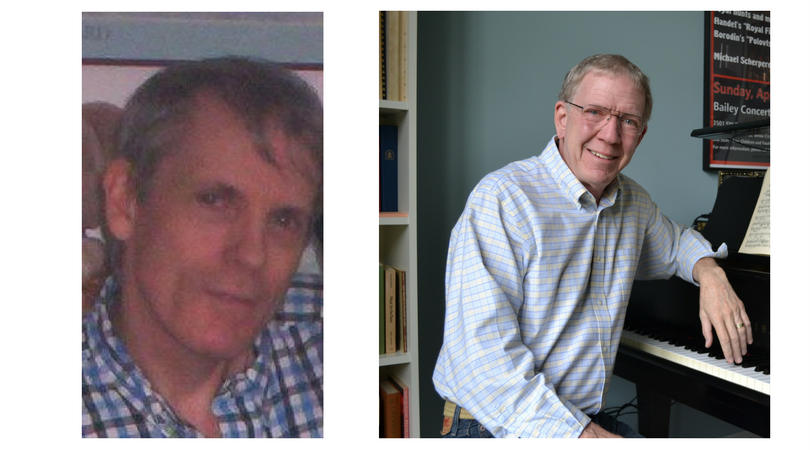
Brian: Michael, there must be a great story for the origin of this song. Would you mind sharing it?
Michael: This rather silly song was fun to write and DavidMichael Schuster (the David of the dedicatees) and I had a blast performing it. The other dedicatee, by the way, is Eric Stark, Music Director of the Indianapolis Symphonic Choir. Eric posted on Facebook a photo of the brass plaques posted next to some new toilets on the campus of Butler University and dared—jokingly, I think—his composer friends to write a song using the words. So I did!
Brian: The quick meter changes throughout give a very unique flow to the piece. What inspired you to use such different meters?
Michael: I have a bit of a penchant for meter changes. In my vocal writing, I try to let the text dictate that, of course. Such changes, along with asymmetrical rhythmic patterns, can provide a lot of amplification to text. It’s my intention—whether always fully realized or not may be another question!—to underscore some aspect of the words, whether to slow them down for emphasis or speed them up for tension. I recently conducted a recording of my chamber opera “Thompson’s Luck”, a work in which both odd meters and meter changes figure prominently. You could peruse a redacted score on my website if you’re interested. The role of Steve Thompson is particularly rife with not only rhythmic angularity but also melodic tension—lots of 7ths and 9ths—since these compositional tools seemed to me to best reflect the man’s character.
Don't miss these songs! Get tickets for the 2nd Annual Fresh Squeezed Ounce of Art Song!
____
Rodney Rawlings, a Torontonian, has had his art songs and concert band pieces performed in Toronto; in Chicago; in Chautauqua, New York; in Geneva, Illinois; in Elgin, Illinois; and in Munster, Indiana. He traces his initial passion for art song to an early encounter with Franz Lehár’s DIE LUSTIGE WITWE. Rodney writes the lyrics to almost all his songs, which concern reverence, aspiration, independence, and the future. These themes also occur in those songs for which he has adapted an existing text.
To find out more about Rodney, visit his website https://ca.linkedin.com/in/rodneyrawlings.
____
Michael Scherperel studied composition and conducting at the Eastman School of Music where his principal instrument was organ. He later undertook graduate studies in piano, composition, and conducting at Boston University. He holds a B.A. in chemistry from Harvard and a M. Mus. in accompanying from the University of Miami. Mr. Scherperel has been at various times a vocal coach at the American Institute of Musical Studies (Graz, Austria), chorusmaster and assistant conductor with the Greater Miami Opera (now the Florida Grand Opera), music director of the Broward Symphony Orchestra, and artistic director of the Fort Lauderdale Symphony Chorus. Mr. Scherperel was a founding member of the Miami Chamber Trio and makes frequent appearances in chamber music and vocal concerts.
To find out more about Michael, visit his website www.michaelscherperel.com.
Meet FSOAS '17 Winning Composer Juliana Hall
One Ounce Opera is humbled to introduce you to Juliana Hall, whose work has been performed and commissioned by some of classical music's greatest voices. We can't wait to share Juliana's duet, Music Like a Curve of Gold, on Friday, November 3rd.
The duet is a setting of Sara Teasdale's poetry. OOO Soprano Rebekah Smeltzer Staley and Mezzo-soprano Julie Silva -- who will perform the piece at Fresh Squeezed Ounce of Art Song -- had these questions for Ms. Hall:
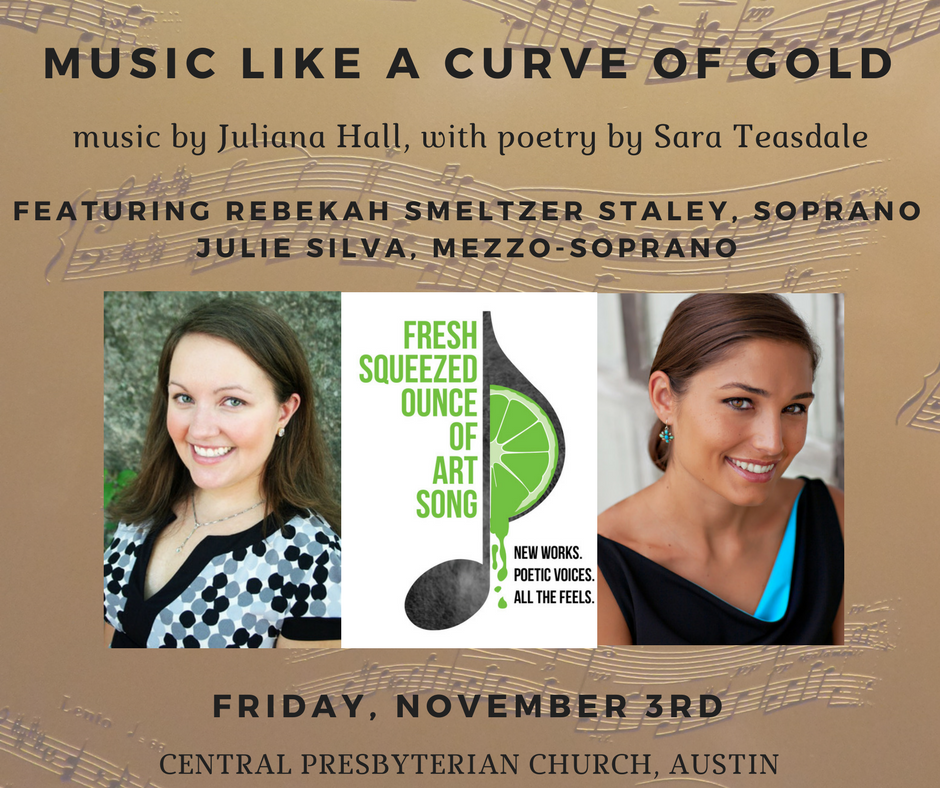 Rebekah: In looking through your bio & other interviews, it seems you had an early interest in composition, but you didn’t pursue it as a career/education option until you were working on your Masters. What finally convinced you to pursue composition?
Rebekah: In looking through your bio & other interviews, it seems you had an early interest in composition, but you didn’t pursue it as a career/education option until you were working on your Masters. What finally convinced you to pursue composition?
Juliana Hall: Having grown up in a village of 3000 people in the southern Ohio countryside, composers were - literally - the stuff of history books. I had begun piano lessons when I was six years old, with my mother, and before officially becoming a composer had studied piano very intensely for 20 years...I enjoyed playing, and just really had no sense of what a life in composition might mean in practical terms. People in history books were composers, not "us."
Despite enjoying piano, though, it never felt completely natural to me, so when I finally began taking composition lessons in graduate school at Yale, I had a sensation for the first time in my life that I had actually found an activity that felt natural, and it seemed to me that I had found a home of sorts. My teachers - Martin Bresnick, Leon Kirchner, and Frederic Rzewski - all encouraged me (and very strongly too) to change my major to composition. Perhaps without their support, I might never have become a composer...but the combination of experiencing an activity that just felt "right" at the same time that such established composers were showing me such encouragement was enough to allow me to take that leap of faith, and so my Master's degree was in composition, and not piano.
After Yale, I completed my studies with Dominick Argento. Dominick was incredibly supportive of my work, and has been for the past 30 years. He really gave me a sense of some of the practicalities I would face, were I to pursue a life of composing...not always easy realities, he didn't sugar coat the difficulties inherent in this profession. In spite of those difficulties, his support added to that of my previous teachers, and I was able to leave school with a sense that I had found my place in the world and, come what may, I would be able to create songs that helped me to express the wonderful beauty and truths the great poets open to us.
Rebekah: Why write Music Like a Curve of Gold as a duet? (Also, if the piece was a commission, did you choose the texts, or did the commissioners?)
Juliana Hall: Several years ago, the vocal duo Feminine Musique (comprised of soprano Korliss Uecker and mezzo soprano Tammy Hensrud) commissioned me for a piece, as they specialize in art song by women composers. At the time I had an idea for a very large setting of Elizabeth Bishop's poem "Roosters," which I wrote for them (and which they will be premiering on January 19, 2018 at the Hartt School of Music). However, "Roosters" is 20 minutes in length, and due to programming considerations imposed on them by presenters, they also wanted a short work that could more easily fit into shorter programs.
"Music like a Curve of Gold" was the short work, then, that resulted from their request. My husband is a cellist, and he helps me in many aspects of my career...so it was actually my husband (who has an excellent sense of how various texts go together) that chose the two poems by Sara Teasdale. I love the two poems: very lyrical and the sentiments expressed are things I believe in. They speak to the human need to feel we have lived a life worth living, that we are grateful, and that we sought goodness and beauty...and I think a vocal duo provides the perfect balance of richness reflective of the texts, while being just spare enough not to lapse into sentimentality.
Julie S: What inspired you to set Sara Teasdale's texts? What was it about her words and/or her life that drew you in?
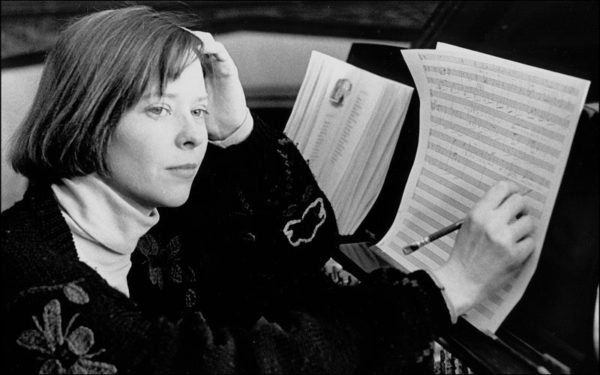
Juliana Hall: In most cases, I am not concerned with a poet's life when putting together a new piece. Of course, if I'm setting letters I might have an interest in knowing a bit more, or if - as in the case of a recent cycle of mine written on excerpts from Anne Frank's diary - there is an intrinsic connection between the texts and the person's character or life events that is stronger than usual, then I'll naturally take his or her life into account. For the most part, however, it is the text itself that I work with - just a few words in isolation, so that I can hear them "speaking" to me...and the message they convey to me becomes what I wish to convey to an audience.
In my days as a younger composer, I'd decide beforehand that I might want to write about night, or about Heaven, or about music...and then I'd find poems to fit into a cycle that worked well together...but these days when planning a new composition, I don't usually choose a topic up front, but begin by reading - a lot! I own over 200 books of poetry, and while I don't go through all of them word for word, I do a quick scan to see whether there are any poets that catch my eye, or any particular poems,or any particular topics...and my husband, who is a cellist and who is really good at putting together texts, joins me...it's a wonderful creative activity we do together, seeking a cycle that "works." It was actually my husband who found the two poems of "Music like a Curve of Gold" and since he knows great poetry, and he knows the type of poetry I tend to enjoy setting, what he found was perfect.
I enjoy very lyrical poetry, very clean and unsentimental poetry. The topics of these two poems are things I believe in very strongly...the value of beauty, and of seeing magic in the ordinary...of wanting to feel things deeply, and of wanting to fully appreciate the gifts of life and love, and all the beauty of the world around us, and the truths which flow from all of these. In these two poems, Sara Teasdale distills these ideas into pure and concise language that is full of gentle musical rhythm and vivid imagery, so they were inspiring texts to depict in musical form.
Julie S.: What is the story behind the process of this particular composition? Where do you like to do your composing, and how long does a project like this take to complete?
Juliana Hall: We live in a small, and relatively sleepy, little New England town...there's not a lot to do, and that is perfect for a composer who wants to produce! Our house is quite small, but it rises three floors, and my studio is on the third floor and has a large bay window so I can watch the birds come and go, and enjoy the trees all around.
Having studied for 20 years to become a professional pianist before I switched my focus to composition, I do my composing at the piano through improvisation. After studying the words, making sure I have a complete sense of each word's meaning and repeating the texts out loud over and over, in order to internalize the rhythm of the text, I begin by playing and singing - both at once - seeking sounds to create a meaningful sound world reflective of the text, and also seeking a vocal line that conveys the text in a way that can, hopefully, be understood without the aid of any printed matter...and in the case of "Music like a Curve of Gold" there are two vocal lines that must work together.
Composition has a number of stages. Even when I can write a song in a day, that song may very well take a full week to become final and ready to sing. Sketching out a song can take anywhere from a day to a week, depending on the size of the text...and then that pencil sketch must be input into the computer, which can take a few hours to a few days (if it's a sizable piece). Then I edit - that is, I add dynamics, expression marks like hairpins, tempos, and the like, that layer "on top of" the notes themselves. This can also take a few days or even weeks for a large cycle. Proofreading and "tweaking" follow...making sure I've correctly input notes and correctly assigned expressions markings...and then allowing myself to improve upon what I've first written, when I see there could be a "better" note here or a more "fluid" vocal line there. Again, days to weeks, depending on size of the composition. Then I give the computer file to my husband, who (since he works in electronic publishing and design) does a beautiful job of laying out the score...once again, days to weeks. After that, both he and I proofread...sometimes making as many as six "round-trips" between us.
"Music like a Curve of Gold" probably took around two months in all...sort of a long time for such a small piece, but it was my first duet piece and presented challenges I'd not encountered before, in order to use the voices in a way that gave each singer some nice lines to sing, but within the texture of a blended sound.
EXPERIENCE Music Like a Curve of Gold on Friday, November 3rd!
___
American art song composer Juliana Hall (b. 1958) is a prolific and highly-regarded composer of vocal music, whose songs have been described as “brilliant” (Washington Post), “beguiling” (Times of London), and “the most genuinely moving music of the afternoon” (Boston Globe). The NATS Journal of Singing wrote that “Hall’s text setting is spot on and exquisite”, and Voix des Arts noted that Hall “perpetuates the American Art Song tradition of Beach, Barber, and Bolcom with music of ingenuity and integrity.”
To learn more about Juliana Hall, including a full biography, please visit her website https://www.julianahall.com/.
Meet FSOAS '17 Winning Composer Marc Hoffeditz
Meet Composer Marc Hoffeditz, whose winning song Ne'er Part I will be sung by Soprano Elise Leung Kotara at the 2nd Annual Fresh Squeezed Ounce of Art Song on Friday, November 3rd.
The text is adapted from the beloved story of Peter Pan. In answering questions from Elise, Marc shares more insight, including how he hopes the audience will experience the piece.
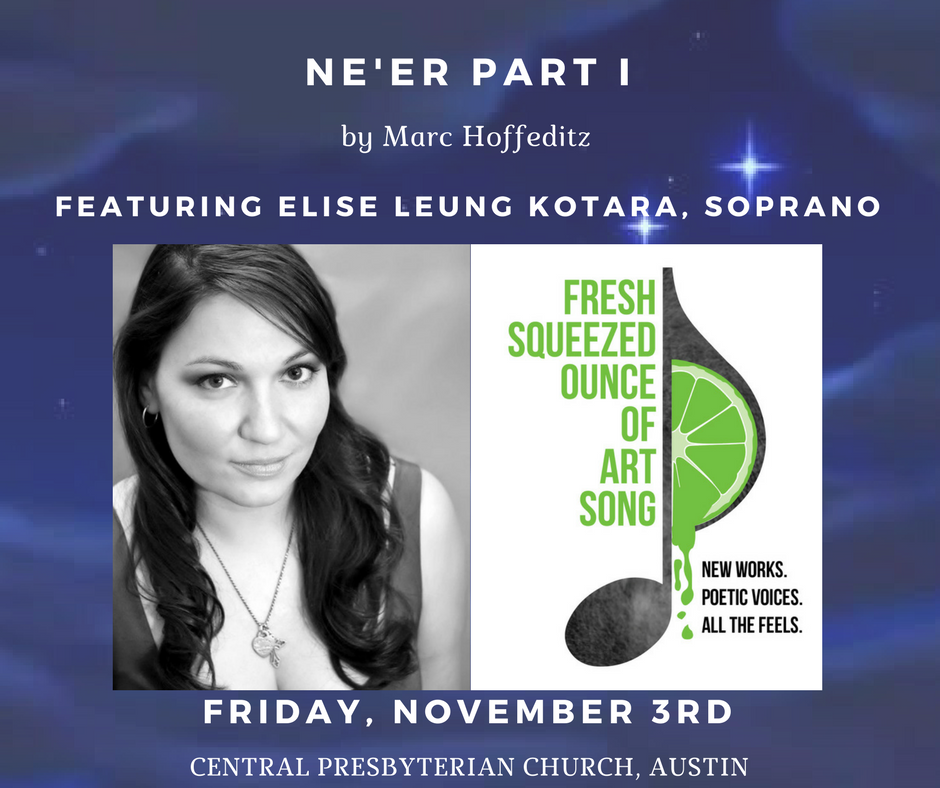 Elise: Peter Pan is a story beloved by adults and children alike. How did you go about preparing the text to be set to music, and what other decisions did you need to make about the text (the time signature, the mood of the piece, different sections of the story…)?
Elise: Peter Pan is a story beloved by adults and children alike. How did you go about preparing the text to be set to music, and what other decisions did you need to make about the text (the time signature, the mood of the piece, different sections of the story…)?
Marc: This text is specifically adapted from the 1911 novel entitled 'Peter and Wendy' (in the public domain-woohoo!), but most people are familiar with the original play (1904, still copyrighted) or the Disney movie. What I love most about this story in particular is that I feel people approach Peter Pan with a cheery mindset, but the original book has a much darker perspective of the action and is framed more from the angle of growing up and the hardships associated with the psychology of aging. 'Two is the end of the beginning' is a line from one of the earlier chapters, referencing the point in which we realize we will not be children forever, and I thought ‘WHAT. THIS IS SO CHILLING. HOW IS THIS A CHILDRENS BOOK’? So I agree, it's definitely a classic for both children and adults, but Barrie's intentions were much deeper than a silly tale about pirates and learning to fly.
A little background on how the piece came to be: It was commissioned by my friend Sarah Hennessey for her senior recital in Boston and she was looking for a piece that described the sensation of being too young to be a grownup, but being too old to be a child. Enter Peter and Wendy! The direction we decided to take was to look at the story from Wendy's perspective and frame it as her, now a mother, looking back at her adventures and reliving certain parts of her youth. A plot beyond retelling the original story was really important to me to solidify why we were revisiting this tale in particular and to help better understand the dramatic construction of the piece. In this case, the beginning, middle, and end are anchors for her role as mother and the portions between reference her transition from child to adult and vice versa.
In terms of preparing the text: I read the whole book, marking different sentences that stuck out or followed the dramatic structure I was looking for. From there, I adapted the remaining fragments into 9 movements (full version), trying to keep as much of the original text as possible instead of trying to paraphrase. Honestly, it took much longer to read, decide on, and adapt the text than it did to write the score, mainly because I was hearing the music as I was working through the story, but I'd never spent so long with the text of a piece before.

In terms of setting the text: My music in general likes to teeter between humor and pathos and I think Part 1 definitely reflects that both textually and formally. As a general rule of construction, I tried to have the more referentially 'child-like' parts of the music written in compound meters and the 'grown up' portions written in simple meters. From there, I wanted to juxtapose the blurriness of identity that Wendy felt by referencing both metrical constructs throughout the piece. This is highlighted in the 2nd movement when mother Wendy sings about her childhood in 6/8 while highlighting two main beats (1 & 4) that suggest it could be a simple meter. In the 3rd movement, Wendy is trying to act like her mother by singing in 2/4, but the appearance of gestural dance interludes that hint to a compound meter interrupt her intentions.
Although this is the first real song cycle I have written with such a strong thematic continuity, I found it important to keep things varied and interesting by trying not to telegraph what might happen next. In the end, the piece is comprised of a bunch of styles and influences, but I think the portions of recitative ground the piece and remind you that you are listening to not just a song cycle, but a very relatable story.
Elise: When did you start composing - and what or who were your early passions and influences?
Marc: I started composing little pieces back in the 6th grade. I didn't really think much of writing music seriously until my senior year, when I wrote a 26 song musical about Abraham and Mary Todd Lincoln called An American Love Story (yes, cheesy as hell). From there, I started studying composition in college and haven't stopped since! (Haven't written another musical though....but maybe that's okay)
I was a big musical theater fan in high school (hence the creation of an egregiously long musical) and I think both Stephen Sondheim and Schwartz were really early influences. The end of Pippin always made me super uncomfortable, yet I couldn’t stop going back to listen and is probably why I like the possibilities of devil’s advocacy in my music. I also remember being 17 or 18 watching Into the Woods and sobbing uncontrollably when ‘Children will listen’ started playing. I think these were really defining musical experiences and a large reason why as to why I like to re-contextualize popular stories and play with a landscape of contrasting emotional experiences
Nowadays, I think my influences include Benjamin Britten, Alban Berg, and an array of styles found in the early 20th century reinterpreted through 21st century ears. I also really respond well to Libby Larsen, Thomas Ades, and George Benjamin. Non-musical influences include anything to do with identity, especially how we formulate it today through our technological word and weird or uncomfortable subjects approached with a sense of universality and pathos.
Elise: Do you have any specific hopes about how people might experience this piece?
Marc: I don't really have any expectations of how people will perceive my works as they are happening, but I think from the performer’s perspective that knowing the larger arc and the beginning-is-the-end aspect should be highlighted. A big reason I love writing vocal music is because I love storytelling and I like to emphasize that to those that perform my works. You are NOT just a singer, you are a story teller! Tell us a story and get us hooked on whatever you are singing! The only way the audience is going to believe what is happening and what they are hearing is if you truly believe it and imbue yourself in it.
JOIN US TO EXPERIENCE ELISE PERFORM MARC'S "Ne'er Part I" on NOV. 3rd!
_____
Marc Hoffeditz is a composer of vocal and instrumental music searching to balance the humors of sarcasm, pathos, camp, and vulnerability. He has made his mark on the indie opera scene with performances by Rhymes with Opera, OperaRox Productions, Hartford Opera Theatre, and Opera from Scratch (Nova Scotia). His song cycle/monodrama Ne’er was chosen for performance at the 2016 Minnesota Source Song Festival, where he worked with acclaimed American composer Libby Larsen. Recent performances include the premiere of There will be no more, a song cycle for tenor and piano with OperaRox Productions in NYC.
To learn more about Marc and his music, visit https://soundcloud.com/marchoffeditz.
